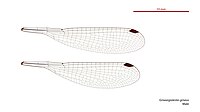Griseargiolestes griseus
Appearance
| Grey flatwing | |
|---|---|

| |
| Male Griseargiolestes griseus | |
| Scientific classification | |
| Domain: | Eukaryota |
| Kingdom: | Animalia |
| Phylum: | Arthropoda |
| Class: | Insecta |
| Order: | Odonata |
| Suborder: | Zygoptera |
| Family: | Argiolestidae |
| Genus: | Griseargiolestes |
| Species: | G. griseus
|
| Binomial name | |
| Griseargiolestes griseus | |

| |
Griseargiolestes griseus is a species of Australian damselfly in the family Argiolestidae,[3] commonly known as a grey flatwing.[4] It is endemic to south-eastern New South Wales, where it inhabits bogs and seepages near small streams.[5]
Griseargiolestes griseus is a medium-sized damselfly, black-green metallic in colour with pale markings. Adults can be strongly pruinescent on their body and tail.[4] Like other members of the family Argiolestidae, it rests with its wings outspread.[6]
Gallery
[edit]-
Female
-
Female
-
Male
-
Tip of female tail
-
Tip of male tail
-
Female wings
-
Male wings
See also
[edit]References
[edit]Wikimedia Commons has media related to Griseargiolestes griseus.
- ^ Dow, R.A. (2017). "Griseargiolestes griseus". IUCN Red List of Threatened Species. 2017: e.T87532549A87534026. doi:10.2305/IUCN.UK.2017-1.RLTS.T87532549A87534026.en. Retrieved 19 November 2021.
- ^ Selys-Longchamps, E. (1862). "Synopsis des Agrionines, troisième légion: Podagrion". Bulletin de la Classe des Science, Académie Royale de Belgique. 2 (in French). 14: 5–44 [40].
- ^ "Species Griseargiolestes griseus (Hagen, 1862)". Australian Faunal Directory. Australian Biological Resources Study. 2022. Retrieved 1 November 2024.
- ^ a b Theischinger, Günther; Hawking, John (2006). The Complete Field Guide to Dragonflies of Australia. Collingwood, Victoria, Australia: CSIRO Publishing. p. 46. ISBN 978-0-64309-073-6.
- ^ Theischinger, Gunther; Endersby, Ian (2009). Identification Guide to the Australian Odonata (PDF). Department of Environment, Climate Change and Water NSW. p. 215. ISBN 978-1-74232-475-3.
- ^ Watson, J.A.L.; Theischinger, G.; Abbey, H.M. (1991). The Australian Dragonflies: A Guide to the Identification, Distributions and Habitats of Australian Odonata. Melbourne: CSIRO. ISBN 0643051368.








